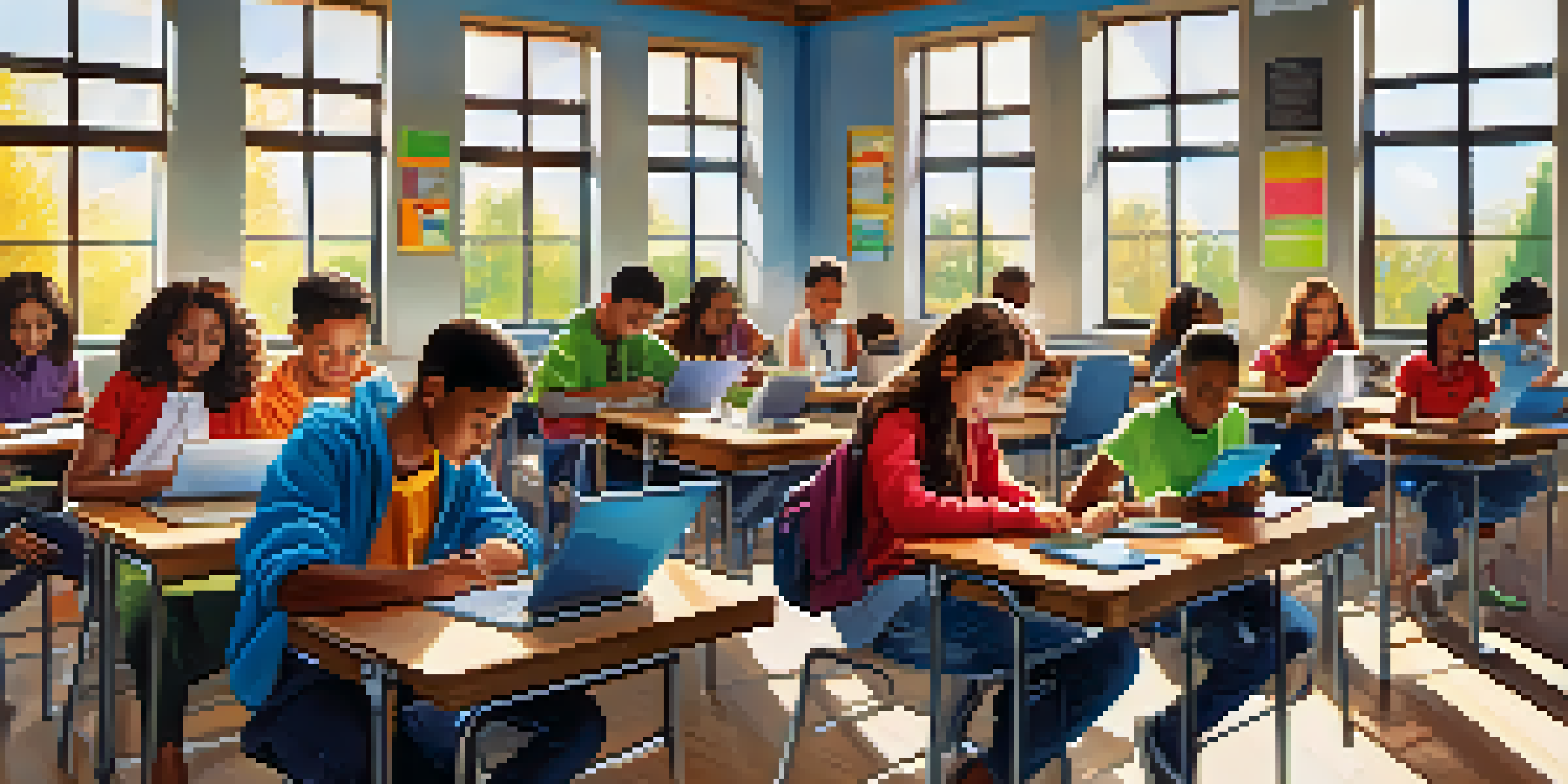The Impact of Mobile Learning on Educator Practices

Understanding Mobile Learning in Education
Mobile learning, or m-learning, refers to educational practices that utilize mobile devices. This can include smartphones, tablets, and even laptops, enabling learning to occur anytime and anywhere. The accessibility of these devices has revolutionized how educators approach teaching, allowing for a more flexible and personalized experience for students.
Mobile learning is not just about the devices; it's about the learning experiences they create.
For instance, a teacher might use a mobile app to create interactive quizzes that students can take on their phones. This not only engages students in a familiar environment but also provides instant feedback to the educator, enhancing the learning process. The shift towards mobile learning encourages educators to rethink traditional teaching methods and adapt to new technologies.
Moreover, as more students become accustomed to learning via mobile devices, educators are finding it essential to integrate these tools into their teaching practices. This trend is not just a passing fad; it represents a significant shift in how education is delivered and received in the 21st century.
Enhancing Student Engagement Through Mobile Learning
One of the most notable impacts of mobile learning is its ability to boost student engagement. With interactive features and multimedia capabilities, mobile learning platforms can capture students' attention more effectively than traditional methods. For example, gamified learning apps encourage participation through fun, competitive elements that motivate students to learn.

Educators report that when students use mobile devices for learning, they tend to be more active participants in their education. This active engagement leads to better retention of information and a deeper understanding of the material. Furthermore, mobile learning can cater to different learning styles, ensuring that all students have the opportunity to succeed.
Mobile Learning Enhances Engagement
Mobile learning tools boost student engagement through interactive features and gamified experiences.
As educators embrace these tools, they can create a more dynamic classroom environment. The integration of mobile learning not only fosters engagement but also encourages collaboration among students, making learning a more communal experience.
Facilitating Differentiated Instruction with Mobile Learning
Differentiated instruction is a teaching approach that tailors learning experiences to meet individual student needs. Mobile learning supports this methodology by providing various resources and activities that accommodate different learning levels. For instance, apps that offer personalized learning paths allow students to progress at their own pace.
Education is the most powerful weapon which you can use to change the world.
By leveraging mobile learning tools, educators can better identify and address the unique strengths and weaknesses of each student. This targeted approach not only enhances learning outcomes but also fosters a sense of autonomy and motivation among students, as they feel more in control of their learning journey.
In essence, mobile learning empowers educators to create a more inclusive and effective learning environment. This flexibility helps to ensure that all students receive the support they need to thrive academically.
The Role of Mobile Learning in Professional Development
Mobile learning isn't just beneficial for students; it also offers tremendous advantages for educators' professional development. With easy access to online courses, webinars, and resources, teachers can enhance their skills and knowledge on the go. This convenience allows for continuous learning, which is crucial in today's rapidly changing educational landscape.
Additionally, mobile learning platforms often feature collaborative tools that enable educators to connect and share insights with peers worldwide. This exchange of ideas can lead to new teaching strategies and improved practices, ultimately benefiting their students. For example, teachers can form virtual study groups to discuss best practices and share resources, promoting a culture of lifelong learning.
Supports Differentiated Instruction
Mobile learning allows educators to tailor educational experiences to meet individual student needs effectively.
By engaging in mobile professional development, educators can stay current with the latest trends and technologies, ensuring that their teaching methods remain effective and relevant.
Overcoming Challenges of Mobile Learning in Education
While mobile learning offers many benefits, it also presents unique challenges that educators must navigate. Issues such as limited access to devices, varying levels of digital literacy among students, and potential distractions can hinder the effectiveness of mobile learning. Addressing these challenges requires thoughtful planning and support from educational institutions.
For instance, schools can implement training sessions to enhance students' digital skills, ensuring they can fully utilize mobile learning tools. Additionally, providing equitable access to devices can help bridge the digital divide, allowing all students to benefit from mobile learning opportunities. By fostering a supportive environment, educators can mitigate potential obstacles.
Ultimately, acknowledging and addressing these challenges is crucial to maximizing the impact of mobile learning in the classroom. With the right strategies in place, educators can create a more effective and inclusive learning experience.
Assessing the Effectiveness of Mobile Learning Tools
To truly understand the impact of mobile learning on educator practices, it's essential to assess the effectiveness of various tools and platforms. Educators can utilize analytics and feedback from students to gauge how well these tools support learning objectives. For example, tracking student progress through mobile apps can provide valuable insights into their engagement and understanding.
Additionally, educators can conduct surveys to gather student opinions on mobile learning experiences. This feedback helps teachers refine their approaches and select the most effective tools for their classrooms. By prioritizing assessment, educators can ensure that mobile learning remains a valuable component of their teaching practices.
Challenges Require Strategic Solutions
Addressing challenges such as device accessibility and digital literacy is essential for maximizing mobile learning's impact.
In this way, continuous improvement becomes a core principle of mobile learning integration. Educators who regularly assess and adapt their use of mobile tools can foster a more effective and engaging learning environment.
The Future of Mobile Learning in Education
Looking ahead, the future of mobile learning in education appears promising. As technology continues to evolve, we can expect even more innovative tools and resources to emerge. This growth will likely enhance the ways educators engage with students and facilitate learning experiences, making education increasingly accessible and personalized.
Moreover, as mobile devices become more integrated into everyday life, their role in education will likely expand. Future trends may include the incorporation of augmented reality (AR) and virtual reality (VR) in mobile learning, providing immersive experiences that further enrich student learning. Such advancements could transform traditional educational approaches and open new avenues for exploration.

Ultimately, the ongoing evolution of mobile learning will empower educators to adapt and thrive in an ever-changing educational landscape. Embracing these changes will be key to maximizing the benefits of mobile learning for both educators and students alike.